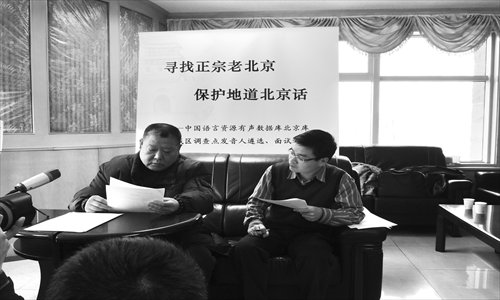
A native Beijinger (left) who took part in the Beijing dialect recording project is interviewed by a linguistics expert. Photo: Courtesy of Ge Zhaoyi
The Beijing linguistics committee said Thursday it is working on a program to record and preserve the Beijing dialect, which it fears dying out.
A pilot project in Pinggu and Xicheng districts is to be expanded citywide next year, said Ge Zhaoyi, from the Beijing Linguistics Committee.
The Beijingers who participated said they almost never spoke a pure "old Beijing" dialect at home any more, as their children or grandchildren could not understand them.
Su Li, a 71-year-old Beijinger who took part in a recording session on Wednesday in Xicheng district, said he was enthusiastic about the project, as he feels that the Beijing dialect is vanishing.
"I've seldom spoken to my son and grandson using Beijing dialect [phrases] at home for decades," he said, adding that the environment for talking in pure dialect no longer exists.
"For instance, we say gele banr (knee) in Beijing dialect but it's xigai in Putonghua, a phrase that my grandson won't understand," he said.
Su said that his grandson does not know much local dialect because his school always corrects his accent to be more standardized.
Yin Shuchao, 61, who has lived in Xicheng district all his life, said he was not sure how and why recording his voice would protect the dialect, but he was happy to take part.
"As a Beijinger, I support this dialect protection work for sure," he said.
The recording sessions involved 93 native Beijingers at the Xicheng district education commission Wednesday. Only seven will be selected as representative voices for the dialect database, said Ge.
Those chosen should be native Beijingers aged from 60-70 and who were born and lived permanently in Beijing.
"The participants must also have a low education level, and those whose family members are all native Beijingers, and with no physical defects like incomplete teeth or a stammer," he said.
For anyone having had more than a high school education, learning standard Putonghua would have diluted their local accent, said Ge.
"An online museum about Beijing linguistic culture will be established based on the collected data," said Ge.
A director of the Dialect Office of Linguistics Research Department of China Academy of Social Sciences, surnamed Li, said that more should be done to protect, instead of merely preserve dialects.
"How a dialect is protected depends on government policy, not this [recording]," he said.
The government could stipulate that not all school lessons be taught in standard Putonghua, said Li.

Copyright ©1999-2011 Chinanews.com. All rights reserved.
Reproduction in whole or in part without permission is prohibited.